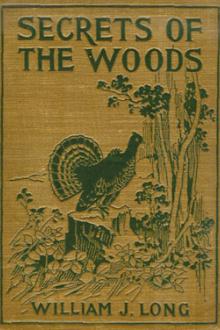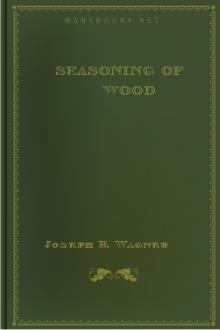Secret of the Woods - William J. Long (e reader for manga .txt) 📗

- Author: William J. Long
- Performer: -
Book online «Secret of the Woods - William J. Long (e reader for manga .txt) 📗». Author William J. Long
Wherever you go in the wilderness you find Meeko ahead of you, and all the best camping grounds preempted by him. Even on the islands he seems to own the prettiest spots, and disputes mightily your right to stay there; though he is generally glad enough of your company to share his loneliness, and shows it plainly.
Once I found one living all by himself on an island in the middle of a wilderness lake, with no company whatever except a family of mink, who are his enemies. He had probably crossed on the ice in the late spring, and while he was busy here and there with his explorations the ice broke up, cutting off his retreat to the mainland, which was too far away for his swimming. So he was a prisoner for the long summer, and welcomed me gladly to share his exile. He was the only red squirrel I ever met that never scolded me roundly at least once a day. His loneliness had made him quite tame. Most of the time he lived within sight of my tent door. Not even Simmo’s axe, though it made him jump twice from the top of a spruce, could keep him long away. He had twenty ways of getting up an excitement, and whenever he barked out in the woods I knew that it was simply to call me to see his discovery,—a new nest, a loon that swam up close, a thieving muskrat, a hawk that rested on a dead stub, the mink family eating my fish heads,—and when I stole out to see what it was, he would run ahead, barking and chuckling at having some one to share his interests with him.
In such places squirrels use the ice for occasional journeys to the mainland. Sometimes also, when the waters are calm, they swim over. Hunters have told me that when the breeze is fair they make use of a floating bit of wood, sitting tip straight with tail curled over their backs, making a sail of their bodies—just as an Indian, with no knowledge of sailing whatever, puts a spruce bush in a bow of his canoe and lets the wind do his work for him.
That would be the sight of a lifetime, to see Meeko sailing his boat; but I have no doubt whatever that it is true. The only red squirrel that I ever saw in the water fell in by accident. He swam rapidly to a floating board, shook himself, sat up with his tail raised along his back, and began to dry himself. After a little he saw that the slight breeze was setting him farther from shore. He began to chatter excitedly, and changed his position two or three times, evidently trying to catch the wind right.
Finding that it was of no use, he plunged in again and swam easily to land.
That he lives and thrives in the wilderness, spite of enemies and hunger and winter cold, is a tribute to his wits. He never hibernates, except in severe storms, when for a few days he lies close in his den. Hawks and owls and weasels and martens hunt him continually; yet he more than holds his own in the big woods, which would lose some of their charm if their vast silences were not sometimes broken by his petty scoldings.
As with most wild creatures, the squirrels that live in touch with civilization are much keener witted than their wilderness brethren. The most interesting one I ever knew lived in the trees just outside my dormitory window, in a New England college town.
He was the patriarch of a large family, and the greatest thief and rascal among them. I speak of the family, but, so far as I could see, there was very little family life. Each one shifted for himself the moment he was big enough, and stole from all the others indiscriminately.
It was while watching these squirrels that I discovered first that they have regular paths among the trees, as well defined as our own highways. Not only has each squirrel his own private paths and ways, but all the squirrels follow certain courses along the branches in going from one tree to another. Even the strange squirrels, which ventured at times into the grove, followed these highways as if they had been used to them all their lives.
On a recent visit to the old dormitory I watched the squirrels for a while, and found that they used exactly the same paths,—up the trunk of a big oak to a certain boss, along a branch to a certain crook, a jump to a linden twig and so on, making use of one of the highways that I had watched them following ten years before. Yet this course was not the shortest between two points, and there were a hundred other branches that they might have used.
I had the good fortune one morning to see Meeko, the patriarch, make a new path for himself that none of the others ever followed so long as I was in the dormitory. He had a home den over a hallway, and a hiding place for acorns in a hollow linden.
Between the two was a driveway; but though the branches arched over it from either side, the jump was too great for him to take.
A hundred times I saw him run out on the farthest oak twig and look across longingly at the maple that swayed on the other side.
It was perhaps three feet away, with no branches beneath to seize and break his fall in case he missed his spring, altogether too much for a red squirrel to attempt. He would rush out as if determined to try it, time after time, but always his courage failed him; he had to go down the oak trunk and cross the driveway on the ground, where numberless straying dogs were always ready to chase him.
One morning I saw him run twice in succession at the jump, only to turn back. But the air was keen and bracing, and he felt its inspiration. He drew farther back, then came rushing along the oak branch and, before he had time to be afraid, hurled himself across the chasm. He landed fairly on the maple twig, with several inches to spare, and hung there with claws and teeth, swaying up and down gloriously. Then, chattering his delight at himself, he ran down the maple, back across the driveway, and tried the jump three times in succession to be sure he could do it.
After that he sprang across frequently. But I noticed that whenever the branches were wet with rain or sleet he never attempted it; and he never tried the return jump, which was uphill, and which he seemed to know by instinct was too much to attempt.
When I began feeding him, in the cold winter days, he showed me many curious bits of his life. First I put some nuts near the top of an old well, among the stones of which he used to hide things in the autumn. Long after he had eaten all his store he used to come and search the crannies among the stones to see if perchance he had overlooked any trifles. When he found a handful of shagbarks, one morning, in a hole only a foot below the surface, his astonishment knew no bounds. His first thought was that he had forgotten them all these hungry days, and he promptly ate the biggest of the store within sight, a thing I never saw a squirrel do before. His second thought—I could see it in his changed attitude, his sudden creepings and hidings—was that some other squirrel had hidden them there since his last visit.
Whereupon he carried them all off and hid them in a broken linden branch.
Then I tossed him peanuts, throwing them first far away, then nearer and nearer till he would come to my windowsill. And when I woke one morning he was sitting there looking in at the window, waiting for me to get up and bring his breakfast.
In a week he had showed me all his hiding places. The most interesting of these was over a roofed piazza in a building near by. He had gnawed a hole under the eaves, where it would not be noticed, and lived there in solitary grandeur during stormy days in a den four by eight feet, and rain-proof. In one corner was a bushel of corncobs, some of them two or three years old, which he had stolen from a cornfield near by in the early autumn mornings.
With characteristic improvidence he had fallen to eating the corn while yet there was plenty more to be gathered. In consequence he was hungry before February was half over, and living by his wits, like his brother of the wilderness.
The other squirrels soon noticed his journeys to my window, and presently they too came for their share. Spite of his fury in driving them away, they managed in twenty ways to circumvent him.
It was most interesting, while he sat on my windowsill eating peanuts, to see the nose and eyes of another squirrel peering over the crotch of the nearest tree, watching the proceedings from his hiding place. Then I would give Meeko five or six peanuts at once. Instantly the old hiding instinct would come back; he would start away, taking as much of his store as he could carry with him. The moment he was gone, out would come a squirrel—sometimes two or three from their concealment—and carry off all the peanuts that remained.
Meeko’s wrath when he returned was most comical. The Indian legend is true as gospel to squirrel nature. If he returned unexpectedly and caught one of the intruders, there was always a furious chase and a deal of scolding and squirrel jabber before peace was restored and the peanuts eaten.
Once, when he had hidden a dozen or more nuts in the broken linden branch, a very small squirrel came prowling along and discovered the store. In an instant he was all alertness, peeking, listening, exploring, till quite sure that the coast was clear, when he rushed away headlong with a mouthful.
He did not return that day; but the next morning early I saw him do the same thing. An hour later Meeko appeared and, finding nothing on the windowsill, went to the linden. Half his store of yesterday was gone. Curiously enough, he did not suspect at first that they were stolen. Meeko is always quite sure that nobody knows his secrets. He searched the tree over, went to his other hiding places, came back, counted his peanuts, then searched the ground beneath, thinking, no doubt, the wind must have blown them out—all this before he had tasted a peanut of those that remained.
Slowly it dawned upon him that he had been robbed and there was an outburst of wrath. But instead of carrying what were left to another place, he left them where they were, still without eating, and hid himself near by to watch. I neglected a lecture in philosophy to see the proceedings, but nothing happened.
Meeko’s patience soon gave out, or else he grew hungry, for he ate two or three of his scanty supply of peanuts, scolding and threatening to himself. But he left the rest carefully where they were.
Two or three times





Comments (0)